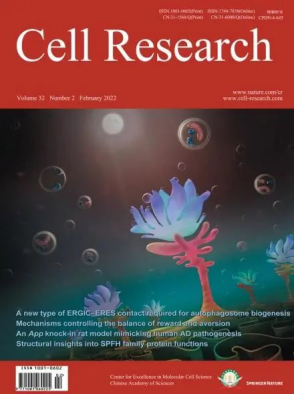- News
Cell Research Published the Research Results of Hongxia Wang's Team from Oncology Center at Shanghai General Hospital about "Regulation of Four Transmembrane Proteins into the Nucleus"
The link of original Chinese report:https://mp.weixin.qq.com/s/wUubAFWyxPFiLvfQ5WsmQQ


On February 23, the renowned journal of biology, Cell Research published the research results of Wang Hongxia's team from Oncology Center of Shanghai General Hospital about the regulation of quadruple transmembrane protein entry signaling, which is also the second time in a year that the journal published the research results of the team in this field.
The four transmembrane protein superfamily (TM4SF) is a group of low-molecular-weight glycoproteins widely expressed in eukaryotic cell membranes and plays an important role in tumor invasion and metastasis, cell adhesion, proliferation, tissue differentiation and lymphocyte activation. In recent years, the research team led by Wang Hongxia has conducted a series of studies on the regulation of TSPAN8, a member of the TM4SF, in tumorigenesis and development. The previous work revealed that the up-regulation of TSPAN8 expression in breast cancer is associated with treatment resistance and poor prognosis, and TSPAN8 can enhance the formation of cell stemness, drug resistance and promote recurrence and metastasis of breast cancer , by activating the Hedgehog signaling pathway (Nat Commun 2019). The activation of EGF/EGFR signaling pathway promotes recurrence and metastasis by upregulation of TSPAN8 transcription through SOX9 (Oncogene 2021).
On February 23, Cell Research published again the research from the team on the regulatory mechanism of TSPAN8 entry signaling in full-text article. The study showed that the transmembrane protein TSPAN8, a unique form of independent membrane structure, is translocated into the nucleus in response to stimuli from extracellular growth factors and metabolic signals. Upon translocation into the nucleus, TSPAN8 regulates chromatin remodeling and the transcription of downstream oncogenes by interacting with STAT3.. The EGFR-AKT-TSPAN8-STAT3 axis has been found to be overactivated in a variety of human cancers, correlating with aggressive phenotypes and poor prognosis. This new discovery breaks the traditional understanding that the biological function of quadruple transmembrane proteins is confined to the membrane/inner membrane, reveals the cytoplasmic transport mode different from the membrane-dependent endocytosis pathway into the nucleus, and expands the molecular regulation theory of multifold transmembrane proteins, , and elucidated the importance of TSPAN8 as a new tumor therapeutic target. On this basis, the group further developed a humanized monoclonal antibody targeting TSPAN8, which showed good therapeutic effects in vitro and in vivo studies.
The Oncology Center of Shanghai General Hospital is a national key clinical specialty, which includes the Department of Medical Oncology, Department of Oncology Radiotherapy, Department of Oncology Intervention, Department of Oncology Molecular Diagnosis and Biotherapy, and is capable of undertaking clinical, scientific research and teaching tasks in oncology. The team has published more than 300 research papers in many renowned journals at home and abroad, and has undertaken more than 30 national projects such as national major research programs, national "973" and "863" programs, and major international cooperation.
The research team recruit postdoctoral perennially, welcome to join us. Please send your resume to:
whx365@126.com.
Correspondent: Junjian Li, Oncology Center, Yang Hu, Department of Publicity
Editor: Shishi Cai, Department of Publicity
